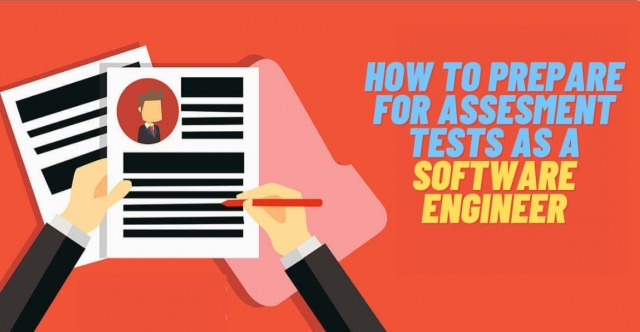As a software engineer, assessment tests are an integral part of your career growth. Whether you are looking for a new job or hoping to advance in your current position, assessment tests are a way to showcase your skills and knowledge to potential employers. However, assessment tests can be challenging and stressful, especially if you are not adequately.
Types of Assessment Tests
There are several types of assessment tests that software engineers may encounter. Coding challenges are perhaps the most common, and they typically involve solving a set of programming problems within a certain time limit.
Technical interviews may involve a mix of coding challenges and more general questions about computer science concepts and technologies.
Aptitude tests may evaluate a candidate's math, logic, and critical thinking skills. It's important to know what type of test you'll be taking in order to prepare effectively.
Here's a table listing some common types of assessment tests for software engineers:
|
Type of Assessment Test |
Description |
|
Technical skills test |
Measures your knowledge and proficiency in programming languages, software development tools, and frameworks. Typically involves coding challenges and problem-solving exercises. |
|
Aptitude test |
Measures your cognitive abilities, problem-solving skills, and critical thinking skills. Includes topics such as math, logic, abstract reasoning, and spatial awareness. |
|
Personality test |
Assesses your personality traits, work style, and communication skills. Can be used to determine whether you are a good fit for the company culture and the role. |
|
Behavioral interview |
Evaluates how you have handled specific situations in the past, and how you would handle hypothetical scenarios. Focuses on your decision-making, problem-solving, and interpersonal skills. |
|
Case study |
Requires you to analyze a real-world scenario and propose a solution. Tests your ability to apply your technical and problem-solving skills to a practical situation. |
Common Challenges and Pitfalls
Preparing for assessment tests as a software engineer role can be challenging. Time constraints are a common challenge, as coding challenges and technical interviews often have strict time limits. It can also be difficult to stay up to date on the latest technologies and programming languages.
Finally, nerves can get in the way of performing at your best. To overcome these challenges, it's important to practice and stay calm.
Strategies for Preparation
There are several strategies you can use to prepare for assessment tests as a software engineer. One of the most effective is to practice coding challenges regularly. There are many websites that offer coding challenges of varying difficulty, such as HackerRank, LeetCode, and CodeSignal.
You can also study algorithms and data structures, which are frequently tested on assessment tests. Finally, researching the company or organization administering the test can help you tailor your preparation to their specific needs and preferences.
How to Prepare for a Technical Assessment as a Software Engineer
Technical assessments are becoming more and more common in the hiring process for software engineers. These assessments are designed to test your technical knowledge, problem-solving skills, and ability to think on your feet. Here are some tips on how to prepare for a technical assessment as a software engineer:
Understand the Technical Assessment
Before you can prepare for a technical assessment, it's important to understand what you'll be tested on. Will the assessment be focused on coding challenges, algorithms, or both? How long will the assessment be? What resources, if any, will be available during the assessment? By understanding the format and expectations of the assessment, you can better tailor your preparation.
Brush Up on Your Technical Skills
Once you have an understanding of what the technical assessment will entail, it's time to brush up on your technical skills. Review computer science concepts, programming languages, and data structures that are likely to be tested. It's also a good idea to study common algorithms and their time and space complexity. Use online resources, textbooks, and coding forums to help you refresh your knowledge.
Practice with Technical Assessment Examples
Practice makes perfect when it comes to technical assessments. Find practice examples that are similar to the type of assessment you'll be taking, and set aside time to work through them. There are many websites that offer coding challenges, technical interviews, and aptitude tests, such as HackerRank, LeetCode, and CodeSignal. Not only will practice help you feel more comfortable with the format of the assessment, but it will also give you a chance to identify areas where you need to improve.
Get Mentored or Seek Professional Help
If you're feeling overwhelmed or unsure of how to prepare for a technical assessment, seek help from a mentor or professional. Ask colleagues or friends who have gone through similar assessments for advice, or hire a technical coach to help you prepare. A mentor or coach can help you identify areas where you need to improve, provide feedback on your performance, and offer guidance on how to approach the assessment.
Prepare for the Logistics
Finally, make sure you're fully prepared for the logistics of the technical assessment. Make sure you know where and when the assessment will take place, and arrive early to allow yourself time to get settled. Check your internet connection, software versions, and hardware beforehand to ensure they are compatible with the assessment. Finally, make sure you have any necessary materials, such as a calculator or pen and paper, at hand.
How to Prepare for Aptitude Test for Software Engineers as a Software Engineer
Aptitude tests are commonly used in the hiring process for software engineers. These tests are designed to assess your cognitive abilities, problem-solving skills, and critical thinking skills. Here are some tips on how to prepare for an aptitude test for software engineers:
Understand the Aptitude Test
Before you can prepare for an aptitude test, it's important to understand what you'll be tested on. Aptitude tests can cover a range of topics, such as math, logic, abstract reasoning, and spatial awareness. By understanding the format and expectations of the test, you can better tailor your preparation.
Refresh Your Math Skills
Math is a common component of aptitude tests. Refresh your knowledge of basic math concepts, such as arithmetic, algebra, geometry, and statistics. You should be comfortable with mental math, fractions, percentages, and ratios. If you're unfamiliar with a particular math concept, use online resources, textbooks, and practice exercises to help you improve.
Practice with Aptitude Test Examples
Practice makes perfect when it comes to aptitude tests. Find practice examples that are similar to the type of test you'll be taking, and set aside time to work through them. There are many websites that offer aptitude tests, such as SHL, Kenexa, and Talent Q. Not only will practice help you feel more comfortable with the format of the test, but it will also give you a chance to identify areas where you need to improve.
Improve Your Logical Reasoning
Logical reasoning is another key component of aptitude tests. You should be able to recognize patterns, analyze data, and draw conclusions. Improve your logical reasoning skills by practicing with puzzles, brain teasers, and logic games. You can find many free resources online, such as Puzzle Baron, Brainzilla, and Lateral Puzzles.
Manage Your Time Effectively
Managing your time effectively during the aptitude test is crucial. Make sure you read the instructions carefully and allocate your time accordingly. If the test allows for breaks, make sure you take them to rest and recharge. Stay focused and avoid distractions, such as checking your phone or email.
Tips on how to prepare for assessment tests as a Software Engineer
Crossover that specializes in remote work and talent management for software engineers. They have shared some valuable tips on how to prepare for assessment tests, which can help you improve your performance and succeed in your career.
Practice coding challenges
Crossover recommends practicing coding challenges to improve your coding skills and problem-solving abilities. You can find coding challenges online or through coding challenge platforms like HackerRank or Codewars.
Build real-world projects
Building real-world projects can help you gain practical experience and demonstrate your skills to potential employers. You can work on open-source projects or build your own projects to showcase your abilities.
Learn new technologies
Learning new technologies can help you broaden your skillset and stay up-to-date with the latest trends in software development. You can take online courses, attend conferences or meetups, or read blogs and articles to learn about new technologies.
Prepare for behavioral questions
Behavioral questions are common in assessment tests and focus on your work experience, communication skills, and problem-solving abilities. Crossover suggests preparing for these questions by practicing your responses and highlighting your achievements and accomplishments.
Practice time management
Assessment tests often have time limits, so practicing time management is crucial for success. Crossover recommends practicing coding challenges or timed tests to improve your speed and accuracy.
Stay organized
Staying organized can help you manage your preparation effectively and reduce stress. Crossover suggests creating a study schedule, setting goals, and tracking your progress to stay on track.
Learn to manage stress
Assessment tests can be stressful, but learning to manage stress is crucial for success. Crossover suggests practicing relaxation techniques like meditation or deep breathing exercises to calm your nerves and improve your focus.
Conclusion
Preparing for an aptitude test as a software engineer takes time and effort, but with the right mindset and preparation, you can succeed. By understanding the format and expectations of the test, refreshing your math skills, practicing with examples, improving your logical reasoning, and managing your time effectively, you can increase your chances of acing the test. Remember to stay calm, focused, and confident, and trust in your cognitive abilities. Good luck!






